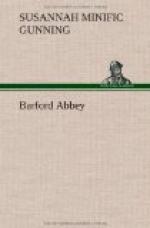The old coachman, as we drove up the lawn, eyed me attentively, saying to the footman, It will be so, John, you may depend upon it.—John answer’d only by a shrug.—What either meant, I shall not pretend to divine.—As I came near the house, I met Mr. Jenkings almost out of breath, and, pulling the string, he came to the coach-side. I was hurrying home, my dear young Lady, said he, to—to—to—Now faith I’m afraid you’ll be angry.
Angry with you, Sir!—angry with you, Mr. Jenkings!—is it possible!
Then, to be plain, Madam, I was hurrying home, to request you would wear no cap.—Never shall I forget how pretty you look’d, when I saw you without one!—Of all things, I would this day wish you might look your best.
To satisfy him I had taken some little pains in honour to the family, I let back the hood of my cloke.—He examin’d the manner in which my hair was dress’d, and smiled his approbation;—which smile, though only seen in the eyes, was more expressive than a contraction of all the other features.—Wishing me a happy day, he bid the coachman drive on.
Coming within sight of the Abbey, my heart beat as if breaking from confinement.—I was oblig’d to call it to a severe trial,—to ask, Why this insurrection,—whence these tumults?—My monitor reply’d, Beware of self-sufficiency,—beware of its mortifying consequences.—
How seasonable this warning against the worst of foes!—a foe which I too much fear was stealing on me imperceptibly,—else why did I not before feel those sensations?—Could I receive greater honour than has been conferr’d on me by the noblest mind on earth!—by Lady Mary?—Could I behold greater splendor than Lady Mary is possess’d of!—What affection in another can I ever hope for like Lady Mary’s!—Thus was I arguing with myself, when the coach-door open’d, and a servant conducted me to the drawing-room,—where, I was receiv’d by Sir James and Lady Powis with an air of polite tenderness;—a kind of unreserve, that not only supports the timid mind, but dignifies every word,—every action,—and gives to education and address their highest polish.
Lord Darcey was sitting in the window, a book in his hand;—he came forward as Sir James introduc’d me, who said, Now, my Lord, the company of this young Lady will make your Lordship’s time pass more agreeably, than it could have done in the conversation of two old people.—My spirits were flutter’d; I really don’t recollect his reply; only that it shew’d him master of the great art, to make every one pleas’d with themselves.
Shall I tell you, my dear Lady, what are my thoughts of this Lord Darcey?—To confess then, though his person is amazingly elegant, his manners are still more engaging.—This I look upon to be the natural consequence of a mind illumin’d with uncommon understanding, sweetness, and refinement.




